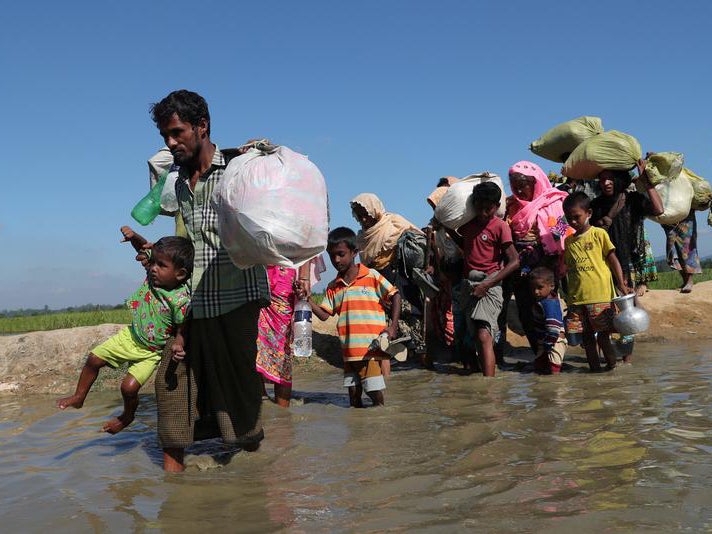Rohingya crisis: Burma quotes Donald Trump in dismissing persecution of Muslim minority as 'fake news'
State continues to deny genocide accusations and borrows US President's most enduring catchphrase - despite White House condemnation of 'ethnic cleansing'

He was a member of the Rohingya student union in college, taught at a public high school and even won a parliamentary seat in Burma's thwarted elections in 1990.
But according to the government of Burma, Kyaw Min’s fellow Rohingya do not exist.
A long-persecuted Muslim minority concentrated in Burma's Rakhine state, the Rohingya have been deemed dangerous interlopers from neighbouring Bangladesh. Today, they are mostly stateless, their very identity denied by Buddhist-majority Burma.
“There is no such thing as Rohingya,” said Kyaw San Hla, an officer in Rakhine’s state security ministry. “It is fake news.”
Such denials bewilder Kyaw Min. He has lived in Burma all of his 72 years, and the history of the Rohingya as a distinct ethnic group in Burma stretches back for generations before.
Now, human rights watchdogs warn that much of the evidence of the Rohingya’s history in Burma is in danger of being eradicated by a military campaign the United States has called ethnic cleansing.
Since late August, more than 620,000 Rohingya Muslims, about two-thirds of the population that lived in Burma in 2016, have fled to Bangladesh, driven out by the military’s campaign of massacre, rape and arson in Rakhine.
In a report released in October, the UN High Commissioner for Human Rights said Burma's security forces had worked to “effectively erase all signs of memorable landmarks in the geography of the Rohingya landscape and memory in such a way that a return to their lands would yield nothing but a desolate and unrecognisable terrain.”
The UN report also said the crackdown in Rakhine had “targeted teachers, the cultural and religious leadership, and other people of influence in the Rohingya community in an effort to diminish Rohingya history, culture and knowledge.”
“We are people with our own history and traditions,” said Kyaw Hla Aung, a Rohingya lawyer and former political prisoner.
“How can they pretend we are nothing?” he asked.
Bullets and burns: injured Rohingya refugees
Show all 10Five years ago, Sittwe, the capital of Rakhine, was a mixed city, divided between an ethnic Rakhine Buddhist majority and the Rohingya Muslim minority.
But since sectarian riots in 2012, the city has been mostly cleared of Muslims. Across central Rakhine, about 120,000 Rohingya, even those who had citizenship, have been interned in camps, stripped of their livelihoods and prevented from accessing proper schools or health care.
The New York Times
Subscribe to Independent Premium to bookmark this article
Want to bookmark your favourite articles and stories to read or reference later? Start your Independent Premium subscription today.

Join our commenting forum
Join thought-provoking conversations, follow other Independent readers and see their replies